George Wharton Edwards
George Wharton Edwards (March 1859 – January 18, 1950) was an American impressionist painter and illustrator, and the author of several books of travel and historical subjects.
George Wharton Edwards | |
|---|---|
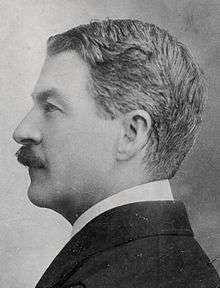 circa 1908 | |
| Born | 1859 |
| Died | 1950 |
| Nationality | American |
| Known for | Painting, impressionist |
Early life and education
Edwards was born in Fair Haven, Connecticut in March 1859.[1] He showed an interest in art from a young age, and began his painting career on neighborhood barns and fences. He moved to Greenwich in 1912.
Edwards was educated at Antwerp and Paris.[1] He was a member of the Cos Cob Art Colony.
Art and career
Edwards was art director of Collier's magazine from 1896 to 1903. He was manager of the art department of the American Bank Note Company from 1904 to 1912.[1] He was a contributor both as a writer and illustrator for Harper's Magazine[2]
In 1884 Edwards was awarded prizes at an art exhibition in Boston, and went on to receive honors from other cities in the United States and Countries in Europe, including:
- The Order of the King of Belgium
- The Order L'Académie française d'Art
- Chevalier of the Legion of Honor
- Chevalier of the Order of the Crown of Belgium
- Chevalier of the Order of Isabella the Catholic
- Chevalier of the Royal Order of the Crown of Italy[1]
His mural "Hendrik Hudson" hung at the United States Military Academy at West Point, and he painted defense posters for Greenwich in both the first and second world wars.[1] In addition to writing and painting, he designed bookplates for local people and institutions in the North East.
In 1930 he was elected into the National Academy of Design as an Associate member, and became a full Academician in 1945.
- Bookplates by George Wharton Edwards
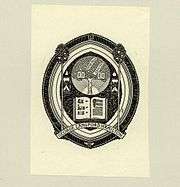 Bookplate for George Langford Hamilton
Bookplate for George Langford Hamilton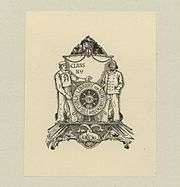 Bookplate for New London Public Library, showing fishermen.
Bookplate for New London Public Library, showing fishermen.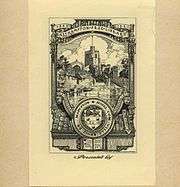 Bookplate for the East Hampton Library
Bookplate for the East Hampton Library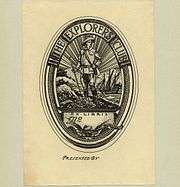 Bookplate for "The Explorers Club"
Bookplate for "The Explorers Club"
Personal life
He married Anne Cox in March 1896. They were married until her death in Greenwich, Connecticut in 1923.[1]
Edwards enjoyed traveling, having crossed the Atlantic so frequently that he had "lost count."[1] He wrote and illustrated books about many of the places he had been.
Death
Edwards died in Greenwich, Connecticut at the age of 90.
Bibliography
Author and Illustrator
- The Book of Old English Ballads
- Vanished Towers and Chimes of Flanders
- Holland
- London
- Vanished Halls and Cathedrals of France
- Break o'day, and Other Stories
- Alsace-Lorraine
- The Forest of Arden
- Brittany and the Bretons
- Spain
- Paris
- Constantinople. Istamboul.
Illustrator Only
- The Princess Pocahontas, by Virginia Watson
- When a Cobbler Ruled a King, by Augusta Huiell Seaman
- Jacqueline of the Carrier Pigeons, by Augusta Huiell Seaman
- Hans Brinker: or, the Silver Skates, by Mary Mapes Dodge
- The Sun Dial: a poem, by Austin Dobson
- The Book of Christmas, by Clement Clarke Moore
- Bird gods, by Charles De Kay (1898)
- The Last Leaf Poem by Oliver Wendell Holmes, Houghton, 1895
References
- "George Wharton Edwards, World Acclaimed Painter, Dies At Whitherell Hospital", Greenwich Time (January 18, 1950)
- George Wharton Edwards at Harper's Magazine
External links
| Wikisource has original works written by or about: George Wharton Edwards |
- Bio at Pierce Galleries
- Works by George Wharton Edwards at Project Gutenberg
- Works by George Wharton Edwards (illustrator) at Faded Page (Canada)
- Works by or about George Wharton Edwards at Internet Archive
- Works by George Wharton Edwards at LibriVox (public domain audiobooks)

- UNCG American Publishers' Trade Bindings: George Wharton Edwards
- Bookplates by George Wharton Edwards in the University of Delaware Library's William Augustus Brewer Bookplate Collection